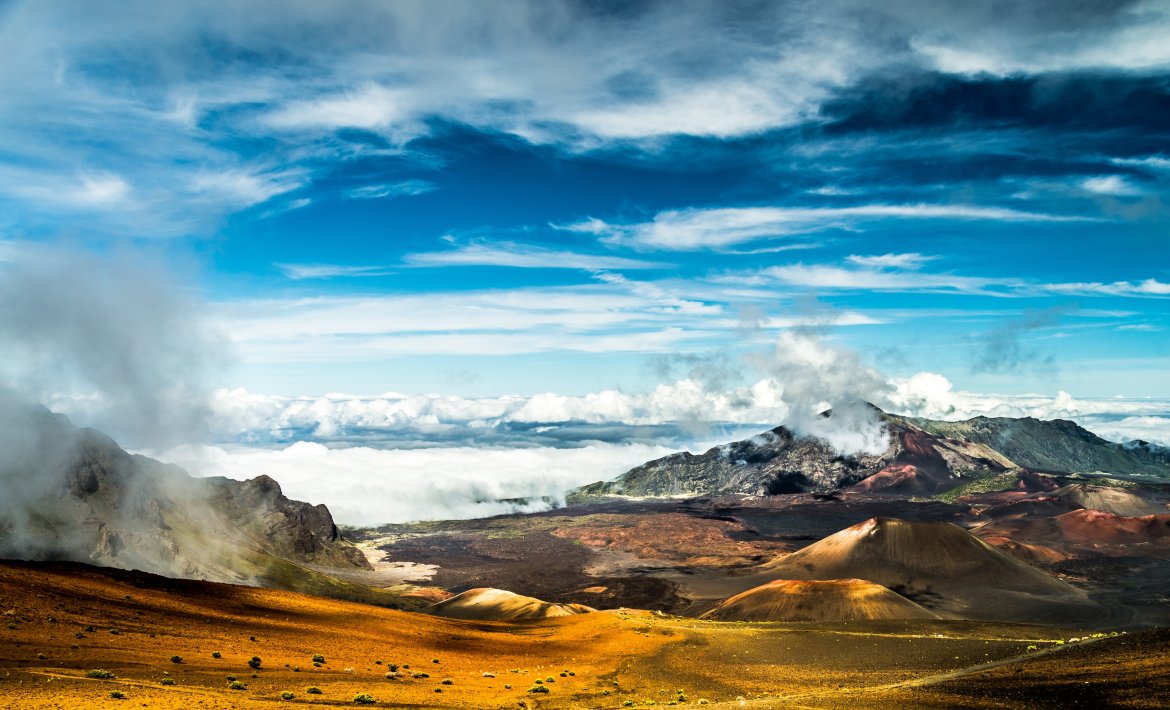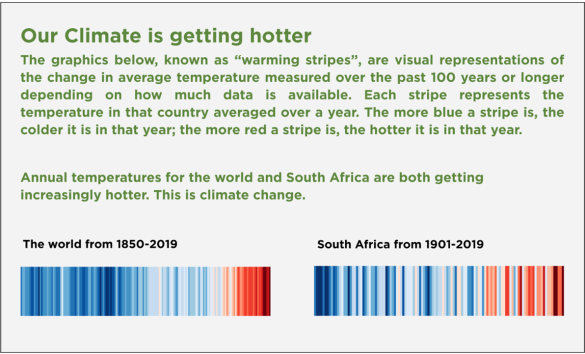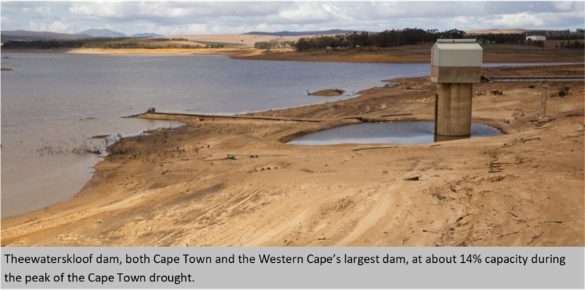The Impact of Energy on Climate Change
Quick Links to content on this page:
Introduction to Climate Change
Introduction to Climate Change
The Earth’s climate is changing, it is getting hotter and 97% of scientists studying the earth’s climate agree this is because of human activities that emit planet-warming gases, referred to as Greenhouse Gases. The human activities emitting Greenhouse Gases are mainly the burning of fossil fuels like coal, petroleum / oil, and gas - but include other human activities like deforestation, changing the natural use of land, industrial processes and unsustainable agriculture. The heating of our planet’s climate because of human emissions of Greenhouse Gases is known as “Climate Change” and the heating effect is referred to as Global Warming, although the words are often used interchangeably.
The “warming stripes” shown above was developed by climate scientist Ed Hawkins and shows the climate heating over time, both globally and in South Africa
Climate change is real and people around the world are already feeling its numerous social, economic and environmental impacts.
In the Western Cape, the direct impacts of climate change include:
- Higher average annual temperature.
- Higher maximum temperatures.
- More hot days and more heat waves.
- Higher minimum temperatures.
- Fewer cold days and frost days.
- Reduced average rainfall in the Western Cape, particularly the western parts.
- Rising sea levels
- Increased fire risks
- Increase in the frequency and intensity of extreme weather events, including floods, droughts, and storm surges.
The direct impacts mentioned above create a variety of indirect impacts, such as the impact of increased drought or extreme weather on businesses, employment and food production - or the impact of high temperatures and increased heat waves on human health. If businesses and society continue as normal, climate change will be devastating to economic and social progress, threatening healthy, safety and livelihoods.
As an example, the drought in Cape Town and the Western Cape from 2015 to 2018 was record-breaking, with those three years having the lowest rainfall since record-keeping began. The impact on all business and their employees were profound, with the provinces’ tourism, hospitality and agriculture industries hit hardest. Although Cape Town has experienced several significant droughts in its history, modelling by University of Cape Town (UCT) researchers found the risk of a drought of this size has increased by 300% as a result of climate change in Cape Town and the Western Cape (read more on UCT’s website here).
It is these far-reaching impacts that have resulted in people referring to climate change as a crisis.
We can however slow climate change and prevent its worst impacts. Climate Change is caused by the emission of Greenhouse Gases which take place mostly due to human activities. Crucially, the more Greenhouse Gases we emit, the more the climate heats up and the worse the direct and indirect impacts on human and natural systems become.
To effectively fight climate change and its direct and indirect impacts, we need to reduce the emission of Greenhouse Gases.
Fighting Climate Change in the Energy Sector
Globally, the energy sector and energy use is the largest emitter by far responsible for 73.2% of global Greenhouse Gas emissions (source). This is worse in South Africa where the energy sector is responsible for 79.1% of all Greenhouse Gas emissions (source).
The United Nations’ Intergovernmental Panel on Climate Change (also known as the IPCC) found that stopping the very worst impacts of climate change (and limiting climate change to 1.5 degrees) would require the following key actions in the Energy Sector which need to be undertaken with urgency and increasing ambition:
- Drastically enhancing energy efficiency - using much less energy to do the same or more things.
- Expand the deployment of renewable electricity generation to at least 70% -85% of total electricity generation by 2050.
- Electrify energy use - replace fossil fuel energy use with renewable electricity and energy use.
(Source)
These actions will significantly reduce Greenhouse Gas emissions from the energy sector, considerably slowing the rate of Climate Change and preventing many of its very worst impacts. They will also improve the environmental sustainability of the Energy Sector and contribute to cleaner air and improved human health.
For more information on Climate Change and the Western Cape
- Go to the Western Cape Governments’ Climate Change Explainer Page here.
- Go to the Climate Change Directorates’ webpage on the Western Cape Governments’ Department of Environmental Affairs and Development Planning website here.
For more information on Climate Change and its Impacts
- Go to the United Nations Climate Change page here.
- Go to 350’s Climate Change page here.
- Go to NASA’s Climate Change page here.
- To see the difference between Climate Change impacts at 1.5 degrees compared to 2 degrees read the special report of the United Nations Intergovernmental Panel on Climate Change here.




